-

Nov
29
IFIC Survey States Most Americans Have Tried Plant-Based Meat Alternatives

The International Food Information Council (IFIC) released the results of a survey about plant-based meat alternatives. The purpose of the survey was to see how often plant alternatives are consumed and why. It should be noted that the study was funded by SNI Global (formally the Soy Nutrition Institute) and the United Soybean Board.
Read more
-

Nov
29
Food Prices Continue to Increase Ahead of Thanksgiving

As the holidays approach, the price to prepare your celebratory dinner will likely be higher this year. Factors including the COVID-19 pandemic, labor shortages, transportation costs, and supply chain issues are to blame.
Read more
-

Nov
29
Cattle Contract Library Act of 2021 Advances

A new bill introduced and approved by the House Agriculture Committee would offer transparency in the discrepancy between what cattle producers receive and what consumers are paying for beef.
Read more
-

Nov
29
Animal Activists Upset Over COP26 Menu

The United Nations Climate Change Conference (COP26) was held in Glasgow, Scotland. The event had local and seasonal offerings and took a “plant-forward approach”, with 40% of the menu being plant-based options. The menus also feature a carbon footprint graphic of each item so attendees can be informed of the impact of their choices.
Read more
-

Nov
29
Agriculture Innovation Mission for Climate Established

During the 26th United Nations Climate Change Conference (COP26), the United States and United Arab Emirates (UAE), along with 31 other countries and 48 non-government partners, announced the Agriculture Innovation Mission for Climate (AIM for Climate). “The United States is proud to be launching the Agriculture Innovation Mission for Climate initiative alongside the United Arab Emirates and over 80 partners across the globe," said John Kerry, US special presidential envoy for the climate.
Read more
-

Nov
22
Interpretive Summary: Thyroid hormone suppression in feeder pigs following polymicrobial or porcine reproductive and respiratory syndrome virus-2 challenge
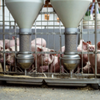
The swine industry continuously battles infectious disease challenges; unfortunately, the nature of our intensive management makes it particularly vulnerable. Understanding how the numerous physiological systems respond to disease is advantageous to scientists working to establish immunity.
Read more
-

Nov
22
Interpretive Summary: Physiological response of weaned piglets to two transport durations observed in a Canadian commercial setting
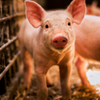
Multi-site pig production is a standard industry practice, though it risks stressing animals during transportation. Most data involving transportation effects was done in market hogs, and the current Canadian transport regulations weigh heavily on these studies' information.
Read more
-

Nov
22
Interpretive Summary: Smith Nutrient Restriction followed by Realimentation sheep
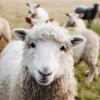
Nutrient restriction in pregnant females has been repeatedly shown to have adverse effects on the growth and development of their offspring. Realimentation following nutrient restriction may be a strategy to mitigate the negative growth effects that maternal nutrient restriction has on offspring.
Read more
-

Nov
18
Interpretive Summary: Repeatability of gaseous measurements across consecutive days in sheep using portable accumulation chambers

Global temperatures are expected to increase over the next thirty years; the implications of climate change will have a large impact on livestock population and production, which will affect food security. Ruminant animals have contributed to 39.8% of global agricultural greenhouse gas emissions, but will play a role in the mitigation of greenhouse gas emissions through the development of sustainable livestock production and the adoption of mitigation measures.
Read more
-

Nov
18
Interpretive Summary: Myostatin suppresses adipogenic differentiation and lipid accumulation by activating crosstalk between ERK1/2 and PKA signaling pathways in porcine subcutaneous preadipocytes

A study recently published in the Journal of Animal Science aimed to determine the effect of myostatin on lipid accumulation in porcine subcutaneous preadipocytes and to further explore the potential molecular mechanisms.
Read more
-

Nov
18
Interpretive Summary: The effect of vitamin C on long-haul transport stress in beef steer calves
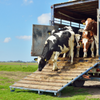
Long-haul transport may occur at several points during the lifespan of feedlot cattle and is a source of undesirable stress on the wellbeing of these animals. Performance can subsequently suffer and lead to reduced health and productivity.
Read more
-

Nov
15
Interpretive Summary: Effect of bone morphogenetic protein 4, gremlin, and connective tissue growth factor on estradiol and progesterone production by bovine granulosa cells
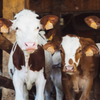
It has been well documented that Bone morphogenic proteins (BMPs) participate in the paracrine regulation of granulosa cell function in multiple species. However, it is unknown if responses to BMPs change with follicular size or interacts with connective tissue growth factor (CTGF) or BMP antagonists (e.g., gremlin) to directly affect granulosa cell function in cattle.
Read more
-

Nov
15
Interpretive Summary: Feeding graded inclusion levels of raw and cooked garbanzo beans to cats
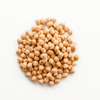
Garbanzo beans (Cicer arietinum) are a popular and important legume food protein crop in human nutrition but is not as well utilized or studied in companion animal nutrition. Because raw garbanzo beans contain anti-nutritional factors, it may potentially have negative impacts on digestibility, fecal characteristics, or the gut health of companion animals.
Read more
-

Nov
15
Interpretive Summary: Fonesca appeasing substance bos indicus summary
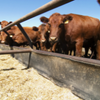
Transport and feedlot entry are among the most stressful events in the lives of feedlot cattle, and the stress from these events tend to adversely impact welfare and productivity. Therefore, there is a great interest in strategies to relieve these stresses to improve welfare and performance.
Read more
-

Nov
11
Interpretive Summary: Effects of bismuth subsalicylate and encapsulated calcium-ammonium nitrate on feedlot beef cattle production
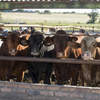
Sulfur is an important element for the ruminant animal due to its role in bacterial growth and metabolism, but high concentrations of dietary sulfur can be related to reductions in growth performance and the incidence of polioencephalomalacia.
Read more
-

Nov
11
Interpretive Summary: Effect of divergence in residual methane emissions on feed intake and efficiency, growth and carcass performance, and indices of rumen fermentation and methane emissions in finishing beef cattle

Global food production has benefitted from the ability of ruminant livestock to convert plant matter into high-quality sources or dairy and meat protein for human consumption, but ruminant derived food products have a much greater carbon intensity. Therefore, mitigation strategies to reduce enteric methane emissions from cattle have been a key research priority for livestock scientists in recent decades.
Read more
-

Nov
08
Interpretive Summary: Effects of roughage type on particle separation, rumination, fiber mat characteristics, in situ degradation, and ruminal fermentation parameters in beef steers
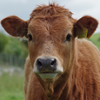
Physically effective neutral detergent fiber (peNDF) is essential for maintaining the rumen epithelial lining and can be estimated based on the diet's particle size and NDF concentration. Roughages have unique physical characteristics that contribute to the density of the ruminal mat and influence ingredient digestibility, retention times, and particle degradation.
Read more
-

Nov
08
Interpretive Summary: Estimation of genetic parameters for superovulatory response traits in Japanese Black cows
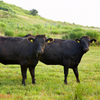
Japanese Wagyu cattle are one of Japan's greatest treasures and are famous for their excellent meat quality. In Japan, embryo transfer is widely used, and the value of Japanese Black calves is much higher than that of the other beef breeds.
Read more
-

Nov
04
Interpretive Summary: Increasing dietary proportion of heat grain in finishing diets containing distillers’ grains: impact on nitrogen utilization, ruminal pH, and digestive function
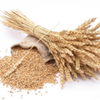
The use of Dried distillers’ grains with solubles (DDGS) in ruminant diets has increased drastically over the last ten years. This alternative feed resource offers a product that is very high in crude protein (CP).
Read more
-

Nov
04
Interpretive Summary: Short term health impacts of feeding cats black soldier fly larvae meal
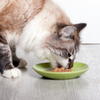
There is currently great potential for including black soldier fly larvae meal (BSFLM, Hermetia illucens) in companion animal feed. Although high in protein and nutrient rich, the health impacts of including BSFLM in companion animal feed are largely unknown.
Read more
 NovIFIC Survey States Most Americans Have Tried Plant-Based Meat Alternatives
NovIFIC Survey States Most Americans Have Tried Plant-Based Meat Alternatives The International Food Information Council (IFIC) released the results of a survey about plant-based meat alternatives. The purpose of the survey was to see how often plant alternatives are consumed and why. It should be noted that the study was funded by SNI Global (formally the Soy Nutrition Institute) and the United Soybean Board.
The International Food Information Council (IFIC) released the results of a survey about plant-based meat alternatives. The purpose of the survey was to see how often plant alternatives are consumed and why. It should be noted that the study was funded by SNI Global (formally the Soy Nutrition Institute) and the United Soybean Board. NovFood Prices Continue to Increase Ahead of Thanksgiving
NovFood Prices Continue to Increase Ahead of Thanksgiving As the holidays approach, the price to prepare your celebratory dinner will likely be higher this year. Factors including the COVID-19 pandemic, labor shortages, transportation costs, and supply chain issues are to blame.
As the holidays approach, the price to prepare your celebratory dinner will likely be higher this year. Factors including the COVID-19 pandemic, labor shortages, transportation costs, and supply chain issues are to blame. NovCattle Contract Library Act of 2021 Advances
NovCattle Contract Library Act of 2021 Advances A new bill introduced and approved by the House Agriculture Committee would offer transparency in the discrepancy between what cattle producers receive and what consumers are paying for beef.
A new bill introduced and approved by the House Agriculture Committee would offer transparency in the discrepancy between what cattle producers receive and what consumers are paying for beef. NovAnimal Activists Upset Over COP26 Menu
NovAnimal Activists Upset Over COP26 Menu The United Nations Climate Change Conference (COP26) was held in Glasgow, Scotland. The event had local and seasonal offerings and took a “plant-forward approach”, with 40% of the menu being plant-based options. The menus also feature a carbon footprint graphic of each item so attendees can be informed of the impact of their choices.
The United Nations Climate Change Conference (COP26) was held in Glasgow, Scotland. The event had local and seasonal offerings and took a “plant-forward approach”, with 40% of the menu being plant-based options. The menus also feature a carbon footprint graphic of each item so attendees can be informed of the impact of their choices. NovAgriculture Innovation Mission for Climate Established
NovAgriculture Innovation Mission for Climate Established During the 26th United Nations Climate Change Conference (COP26), the United States and United Arab Emirates (UAE), along with 31 other countries and 48 non-government partners, announced the Agriculture Innovation Mission for Climate (AIM for Climate). “The United States is proud to be launching the Agriculture Innovation Mission for Climate initiative alongside the United Arab Emirates and over 80 partners across the globe," said John Kerry, US special presidential envoy for the climate.
During the 26th United Nations Climate Change Conference (COP26), the United States and United Arab Emirates (UAE), along with 31 other countries and 48 non-government partners, announced the Agriculture Innovation Mission for Climate (AIM for Climate). “The United States is proud to be launching the Agriculture Innovation Mission for Climate initiative alongside the United Arab Emirates and over 80 partners across the globe," said John Kerry, US special presidential envoy for the climate. NovInterpretive Summary: Thyroid hormone suppression in feeder pigs following polymicrobial or porcine reproductive and respiratory syndrome virus-2 challenge
NovInterpretive Summary: Thyroid hormone suppression in feeder pigs following polymicrobial or porcine reproductive and respiratory syndrome virus-2 challenge The swine industry continuously battles infectious disease challenges; unfortunately, the nature of our intensive management makes it particularly vulnerable. Understanding how the numerous physiological systems respond to disease is advantageous to scientists working to establish immunity.
The swine industry continuously battles infectious disease challenges; unfortunately, the nature of our intensive management makes it particularly vulnerable. Understanding how the numerous physiological systems respond to disease is advantageous to scientists working to establish immunity. NovInterpretive Summary: Physiological response of weaned piglets to two transport durations observed in a Canadian commercial setting
NovInterpretive Summary: Physiological response of weaned piglets to two transport durations observed in a Canadian commercial setting Multi-site pig production is a standard industry practice, though it risks stressing animals during transportation. Most data involving transportation effects was done in market hogs, and the current Canadian transport regulations weigh heavily on these studies' information.
Multi-site pig production is a standard industry practice, though it risks stressing animals during transportation. Most data involving transportation effects was done in market hogs, and the current Canadian transport regulations weigh heavily on these studies' information. NovInterpretive Summary: Smith Nutrient Restriction followed by Realimentation sheep
NovInterpretive Summary: Smith Nutrient Restriction followed by Realimentation sheep Nutrient restriction in pregnant females has been repeatedly shown to have adverse effects on the growth and development of their offspring. Realimentation following nutrient restriction may be a strategy to mitigate the negative growth effects that maternal nutrient restriction has on offspring.
Nutrient restriction in pregnant females has been repeatedly shown to have adverse effects on the growth and development of their offspring. Realimentation following nutrient restriction may be a strategy to mitigate the negative growth effects that maternal nutrient restriction has on offspring. NovInterpretive Summary: Repeatability of gaseous measurements across consecutive days in sheep using portable accumulation chambers
NovInterpretive Summary: Repeatability of gaseous measurements across consecutive days in sheep using portable accumulation chambers Global temperatures are expected to increase over the next thirty years; the implications of climate change will have a large impact on livestock population and production, which will affect food security. Ruminant animals have contributed to 39.8% of global agricultural greenhouse gas emissions, but will play a role in the mitigation of greenhouse gas emissions through the development of sustainable livestock production and the adoption of mitigation measures.
Global temperatures are expected to increase over the next thirty years; the implications of climate change will have a large impact on livestock population and production, which will affect food security. Ruminant animals have contributed to 39.8% of global agricultural greenhouse gas emissions, but will play a role in the mitigation of greenhouse gas emissions through the development of sustainable livestock production and the adoption of mitigation measures. NovInterpretive Summary: Myostatin suppresses adipogenic differentiation and lipid accumulation by activating crosstalk between ERK1/2 and PKA signaling pathways in porcine subcutaneous preadipocytes
NovInterpretive Summary: Myostatin suppresses adipogenic differentiation and lipid accumulation by activating crosstalk between ERK1/2 and PKA signaling pathways in porcine subcutaneous preadipocytes A study recently published in the Journal of Animal Science aimed to determine the effect of myostatin on lipid accumulation in porcine subcutaneous preadipocytes and to further explore the potential molecular mechanisms.
A study recently published in the Journal of Animal Science aimed to determine the effect of myostatin on lipid accumulation in porcine subcutaneous preadipocytes and to further explore the potential molecular mechanisms. NovInterpretive Summary: The effect of vitamin C on long-haul transport stress in beef steer calves
NovInterpretive Summary: The effect of vitamin C on long-haul transport stress in beef steer calves Long-haul transport may occur at several points during the lifespan of feedlot cattle and is a source of undesirable stress on the wellbeing of these animals. Performance can subsequently suffer and lead to reduced health and productivity.
Long-haul transport may occur at several points during the lifespan of feedlot cattle and is a source of undesirable stress on the wellbeing of these animals. Performance can subsequently suffer and lead to reduced health and productivity. NovInterpretive Summary: Effect of bone morphogenetic protein 4, gremlin, and connective tissue growth factor on estradiol and progesterone production by bovine granulosa cells
NovInterpretive Summary: Effect of bone morphogenetic protein 4, gremlin, and connective tissue growth factor on estradiol and progesterone production by bovine granulosa cells It has been well documented that Bone morphogenic proteins (BMPs) participate in the paracrine regulation of granulosa cell function in multiple species. However, it is unknown if responses to BMPs change with follicular size or interacts with connective tissue growth factor (CTGF) or BMP antagonists (e.g., gremlin) to directly affect granulosa cell function in cattle.
It has been well documented that Bone morphogenic proteins (BMPs) participate in the paracrine regulation of granulosa cell function in multiple species. However, it is unknown if responses to BMPs change with follicular size or interacts with connective tissue growth factor (CTGF) or BMP antagonists (e.g., gremlin) to directly affect granulosa cell function in cattle. NovInterpretive Summary: Feeding graded inclusion levels of raw and cooked garbanzo beans to cats
NovInterpretive Summary: Feeding graded inclusion levels of raw and cooked garbanzo beans to cats Garbanzo beans (Cicer arietinum) are a popular and important legume food protein crop in human nutrition but is not as well utilized or studied in companion animal nutrition. Because raw garbanzo beans contain anti-nutritional factors, it may potentially have negative impacts on digestibility, fecal characteristics, or the gut health of companion animals.
Garbanzo beans (Cicer arietinum) are a popular and important legume food protein crop in human nutrition but is not as well utilized or studied in companion animal nutrition. Because raw garbanzo beans contain anti-nutritional factors, it may potentially have negative impacts on digestibility, fecal characteristics, or the gut health of companion animals. NovInterpretive Summary: Fonesca appeasing substance bos indicus summary
NovInterpretive Summary: Fonesca appeasing substance bos indicus summary Transport and feedlot entry are among the most stressful events in the lives of feedlot cattle, and the stress from these events tend to adversely impact welfare and productivity. Therefore, there is a great interest in strategies to relieve these stresses to improve welfare and performance.
Transport and feedlot entry are among the most stressful events in the lives of feedlot cattle, and the stress from these events tend to adversely impact welfare and productivity. Therefore, there is a great interest in strategies to relieve these stresses to improve welfare and performance. NovInterpretive Summary: Effects of bismuth subsalicylate and encapsulated calcium-ammonium nitrate on feedlot beef cattle production
NovInterpretive Summary: Effects of bismuth subsalicylate and encapsulated calcium-ammonium nitrate on feedlot beef cattle production Sulfur is an important element for the ruminant animal due to its role in bacterial growth and metabolism, but high concentrations of dietary sulfur can be related to reductions in growth performance and the incidence of polioencephalomalacia.
Sulfur is an important element for the ruminant animal due to its role in bacterial growth and metabolism, but high concentrations of dietary sulfur can be related to reductions in growth performance and the incidence of polioencephalomalacia. NovInterpretive Summary: Effect of divergence in residual methane emissions on feed intake and efficiency, growth and carcass performance, and indices of rumen fermentation and methane emissions in finishing beef cattle
NovInterpretive Summary: Effect of divergence in residual methane emissions on feed intake and efficiency, growth and carcass performance, and indices of rumen fermentation and methane emissions in finishing beef cattle Global food production has benefitted from the ability of ruminant livestock to convert plant matter into high-quality sources or dairy and meat protein for human consumption, but ruminant derived food products have a much greater carbon intensity. Therefore, mitigation strategies to reduce enteric methane emissions from cattle have been a key research priority for livestock scientists in recent decades.
Global food production has benefitted from the ability of ruminant livestock to convert plant matter into high-quality sources or dairy and meat protein for human consumption, but ruminant derived food products have a much greater carbon intensity. Therefore, mitigation strategies to reduce enteric methane emissions from cattle have been a key research priority for livestock scientists in recent decades. NovInterpretive Summary: Effects of roughage type on particle separation, rumination, fiber mat characteristics, in situ degradation, and ruminal fermentation parameters in beef steers
NovInterpretive Summary: Effects of roughage type on particle separation, rumination, fiber mat characteristics, in situ degradation, and ruminal fermentation parameters in beef steers Physically effective neutral detergent fiber (peNDF) is essential for maintaining the rumen epithelial lining and can be estimated based on the diet's particle size and NDF concentration. Roughages have unique physical characteristics that contribute to the density of the ruminal mat and influence ingredient digestibility, retention times, and particle degradation.
Physically effective neutral detergent fiber (peNDF) is essential for maintaining the rumen epithelial lining and can be estimated based on the diet's particle size and NDF concentration. Roughages have unique physical characteristics that contribute to the density of the ruminal mat and influence ingredient digestibility, retention times, and particle degradation. NovInterpretive Summary: Estimation of genetic parameters for superovulatory response traits in Japanese Black cows
NovInterpretive Summary: Estimation of genetic parameters for superovulatory response traits in Japanese Black cows Japanese Wagyu cattle are one of Japan's greatest treasures and are famous for their excellent meat quality. In Japan, embryo transfer is widely used, and the value of Japanese Black calves is much higher than that of the other beef breeds.
Japanese Wagyu cattle are one of Japan's greatest treasures and are famous for their excellent meat quality. In Japan, embryo transfer is widely used, and the value of Japanese Black calves is much higher than that of the other beef breeds. NovInterpretive Summary: Increasing dietary proportion of heat grain in finishing diets containing distillers’ grains: impact on nitrogen utilization, ruminal pH, and digestive function
NovInterpretive Summary: Increasing dietary proportion of heat grain in finishing diets containing distillers’ grains: impact on nitrogen utilization, ruminal pH, and digestive function The use of Dried distillers’ grains with solubles (DDGS) in ruminant diets has increased drastically over the last ten years. This alternative feed resource offers a product that is very high in crude protein (CP).
The use of Dried distillers’ grains with solubles (DDGS) in ruminant diets has increased drastically over the last ten years. This alternative feed resource offers a product that is very high in crude protein (CP). NovInterpretive Summary: Short term health impacts of feeding cats black soldier fly larvae meal
NovInterpretive Summary: Short term health impacts of feeding cats black soldier fly larvae meal There is currently great potential for including black soldier fly larvae meal (BSFLM, Hermetia illucens) in companion animal feed. Although high in protein and nutrient rich, the health impacts of including BSFLM in companion animal feed are largely unknown.
There is currently great potential for including black soldier fly larvae meal (BSFLM, Hermetia illucens) in companion animal feed. Although high in protein and nutrient rich, the health impacts of including BSFLM in companion animal feed are largely unknown.



